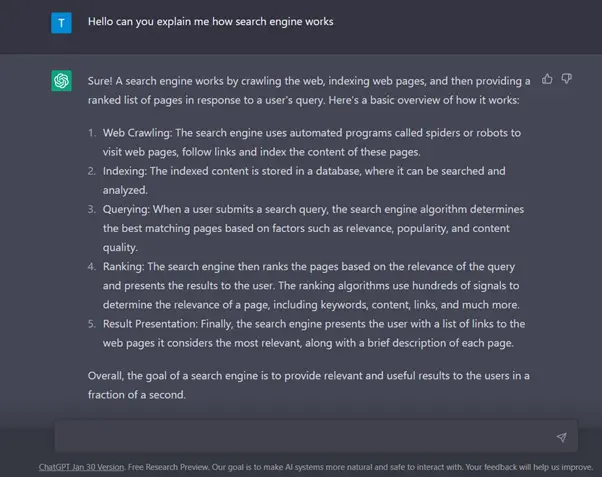Bard: a conversational model integrated with Google.
At a time when some were already composing a requiem for Google, necessarily exceeded by the intelligence of ChatGPT, the first chords of the response are rising. Google presents Bard, its A.I. that dances the LaMDA and that may well set the tempo in the world of artificial intelligence. The tool is already being tested internally and by some external beta testers and should be available in the coming weeks for everyone.
GPT what?
Unless you’ve been living in a cave for the past few weeks and have (very) carefully avoided LinkedIn, you’ve probably heard of ChatGPT, the conversational tool that can generate content developed by OpenAI.
A portmanteau word made up of chat, given the presence of a prompt used to question the tool, and GPT for “Generative Pre-Trained Transformer”: a language processing model in version 3 pre-trained on millions of texts (in short, it eats Wikipedia for breakfast) to predict the rest of a text (and therefore generate a relevant response). The fields of use and possibilities of the latter are numerous: from blog generation to the creation of an advertising strategy through code correction. Its results range from dazzling to distinctly average. As always, with tools, no matter how advanced, the heart of the problem is to use it well (i.e., writing a question as precisely as possible) and to integrate it effectively into your work.

Bard: The Newcomer to the A.I. conversation game
The arrival and the noise generated by ChatGPT has certainly accelerated things on the side of Google, which we feel a little in reaction. Yet artificial intelligence is far from a novelty. The company has centred a great deal of its activity around it (take for example, say, rankbrain for SEO, or this incredible conversation in 2018 at Google I/O. So, Bard is a conversational tool boosted by Artificial Intelligence and, more particularly, by LaMDA, a neat acronym that stands for Language Model for Dialogue Applications.

LaMDA, Lambada, lambawhat?
Like other models (including GPT-3), Bard is built around “Transformer” a neural network developed by Google in 2017, but its model (LaMDA) is specifically built and trained around conversations, their subtleties and nuances. Basically, Bard is your outgoing, cultured friend who can monopolize the conversation in any circumstance, even when it turns to transatlantic trade in the early sixteenth century or the latest developments in cryptocurrency.
What differences between ChatGPT and Bard?
Where ChatGPT has ingested an incredible amount of data in many places (including not-so-recommended corners of the web), Bard (and its model) has been trained to give fact-based information with a dimension of interest and utility. In 2018 Google published a number of principles that they aim to follow in their work on A.I., and it is these, they say, they follow for Bard.
- To benefit society.
- To avoid creating or increasing bias.
- Keeping security its central concern.
- Responsibility towards the individual person.
- Integrating the concepts of private life.
- Upholding the high standards of scientific excellence.
- Being made available for uses consistent with these principles.
What future for Bard and the A.I.s?
The appearance of artificial intelligence in the SERPs is, in itself, a small revolution, but not necessarily an earthquake: as a reminder, zero positions and other search pages where Google offers an answer without the user having to click on a result have existed for a while. Therefore, even if the new model of Google or that of OpenAI that we should see appear in Bing bring their share of novelties, upheavals and intellectual challenges for Search experts, they do not yet seem able to touch some less informational aspects of queries (black leather shoe size 43) or (black cladding house front).
It now remains to be seen how the arrival of MUM and its multimodal capacities (images, texts, video and audio) combined with Bard might radically change the SERPs to offer us a true revolution.
APIs to govern them all
Just like OpenAI, Google seems decided to offer an API to allow developers to offer new tools and new uses to its conversational model. However, this is an element that will not necessarily revolutionize the SERPs, but could well revolutionize the way we work.
ChatGPT, for example, allows incredible time-savings by classifying keywords, writing meta-descriptions or any other task (and believe me, we discover new possibilities every day!). However, the real time-saving comes from the ability to integrate a useful query (example: classification) in a workflow, such as using an API in a Google Sheets script or python code. Once the query is well constructed and the settings are refined, all that then remains is to take advantage of the time-saving on repetitive tasks.
However, as specified, if the arrival of these tools is a clear opportunity, it is not yet the Eldorado that some publications would have us believe. The ability to use it with finesse and efficiency remains dependent on knowledge of the environment, but even more on expertise. To put it simply, asking ChatGPT to build a social Ads strategy and sharing it on LinkedIn is one thing, but actually implementing it and making it grow effectively is another.
In conclusion, the latest advances in terms of artificial intelligence are really exciting and promise real changes, not only in the way we work but also in search engines. However, perceiving all the impacts, positive or negative, is still a complex matter.
Did you find the article interesting? Please share it?

